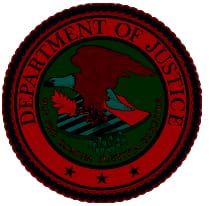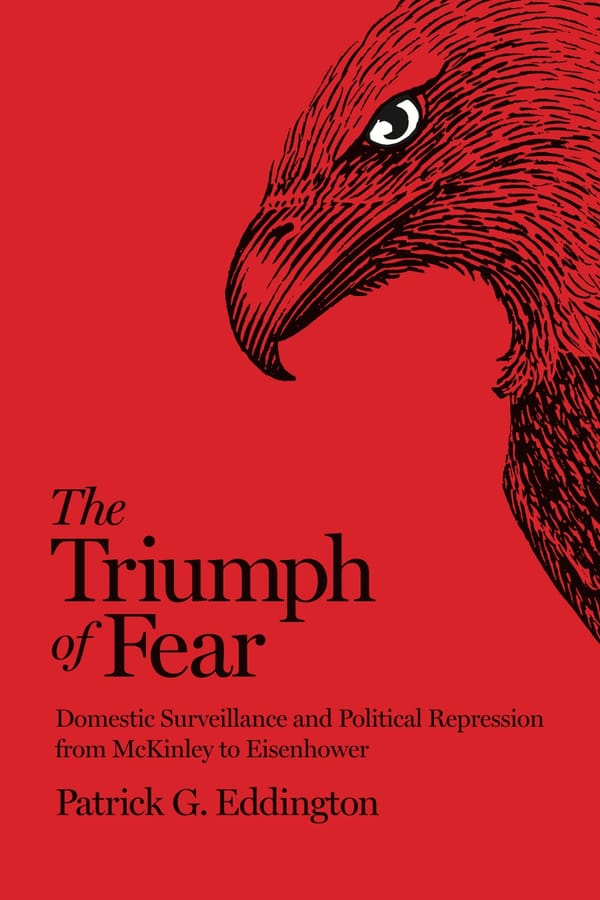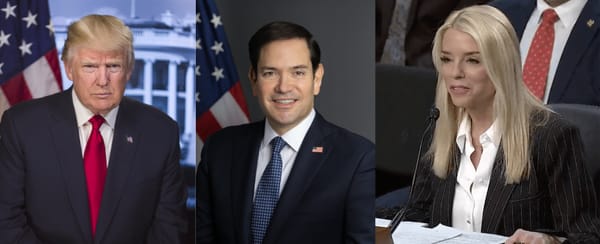A Republic Under Siege
We are now witnessing, in real time, the price for not taking far more aggressive governmental reform and reorganization measures in the wake of successive presidents’ radical abuses of law enforcement and presidential powers.

Trump is moving at break-neck speed to seize full personal political control of the federal bureaucracy. His "Friday Afternoon Massacre" at the Justice Department and FBI is likely just his opening move in turning the coercive power of the federal government against his political enemies and disfavored groups.
This April, Georgetown University Press will release my latest book, the Triumph of Fear: Domestic Surveillance and Political Repression from McKinley through Eisenhower. Ten years ago when I began doing research for the book, I could not have imagined that it would serve as a prologue for yet another era of government-run political repression at scale here at home.
One of the myths about America is that the Bill of Rights acts as a shield against abuses of Executive branch power. The reality is that when the law collides with that raw power, the latter wins every time.
That was the case with the Federalists' employment of the Alien and Sedition Acts against their political opponents.
It was the case when Andrew Jackson defied the Supreme Court and forcibly removed native peoples from Florida to the Oklahoma territory.
It was the case when Abraham Lincoln suspended habeas corpus during the Civil War.
It was the case when FDR rounded up Japanese Americans after the Pearl Harbor attack and put them in concentration camps for nearly the entire war.
Eisenhower authorized the FBI's infamous Counterintelligence Program (COINTELPRO), which began by targeting the Communist Party but grew in scope to encompass the Southern Christian Leadership Conference (and its leader, MLK, Jr.), Students for a Democratic Society, and a host of other organizations and individuals--all without any criminal predicate.
With the exception of the Federalists' overreach with the Alien and Sedition Acts in 1798--the party would be extinct by the early 1820s--presidents and their political party allies in the House and Senate have generally never faced lasting political, much less legal, consequences for their abuses of power.
During the Cold War, Truman started the so-called "loyalty" program targeting federal employees--a bureaucratic anti-communist witch hunt that destroyed the personal and professional lives of thousands of federal workers. Eisenhower not only kept the program but added homosexuality as a disqualifier for federal employment.
These and other government policies were ostensibly aimed at an external enemy--the Soviet Union, its spies, and political fellow travelers in the United States. The policies were misguided, their implementation capricious and without any semblance of due process--but they were policies that had political buy-in from both major political parties. They were not designed to serve the personal interest of a single man. Yet it was only prevailing political norms--not federal laws or the Constitution--that prevented them from being twisted and put in service of the political, financial, and legal interests of a given president.
The mentality driving activities like COINTELPRO and the "loyalty" program was pervasive during the late 1940s through the early 1960s, both inside and outside of government. And while Bill of Rights champions did what they could to politically and legally challenge the "loyalty" program and other Cold War era repressive measures, they met with only limited, episodic success.
It wasn't until the social, political, and cultural upheavals of the 1960s swept the country, along with the whistleblower revelations of people like former Army Captain Chris Pyle, ex-RAND analyst Daniel Ellsberg, and FBI Assistant Director Mark "Deep Throat" Felt, that political and governmental reform efforts led to the end of COINTELPRO, the exposure of the Watergate break-in and Nixon's political subversion operations, and increased protections for federal workers against targeting for dubious national security or overtly political purposes, among other reforms.
What did not happen, what was not even considered, was removing institutions like the Department of Justice and the FBI from the Executive branch, and thus out of presidential control.
We are now witnessing, in real time, the price for not taking far more aggressive governmental reform and reorganization measures in the wake of successive presidents’ radical abuses of law enforcement and presidential powers.
As I noted over two years ago, existing federal law gives a sitting president vast powers to reorganize or reshape Executive branch agencies and departments, including reaching down into the bureaucracies to fire or reassign Senior Executive Service (SES) personnel--the senior managers that are normally the "heat shield" between political appointees and career civil servants. Trump's Friday, January 31 mass firings of FBI SES managers and over two dozen Special Agents in Charge (SACs) demonstrated how easily that "heat shield" can be penetrated by a president whose sole motivation is to use federal power to protect himself and savage his enemies.
And Saturday's New York Times story on the episode makes clear Trump is just getting started:
The Trump administration plans to scrutinize thousands of F.B.I. agents involved in Jan. 6 investigations, setting the stage for a possible purge that goes far beyond the bureau’s leaders to target rank-and-file agents, according to internal documents and people familiar with the matter.
Yesterday, the Times reported that the FBI's New York SAC, James Dennehy, sent an internal email to the FBI NYC Field Office staff that included the following exhortation and de facto challenge to Trump's ongoing Stalinist-like purge at the FBI:
Today, we find ourselves in the middle of a battle of our own, as good people are being walked out of the F.B.I. and others are being targeted because they did their jobs in accordance with the law and F.B.I. policy.
Dennehy's act of defiant leadership is commendable in every way, and it appears that Acting FBI Director Brian Driscoll and senior FBI official Robert C. Kissane have also attempted to push back on Trump's efforts to politicize and weaponize the FBI. Nevertheless, the days of each may be numbered if Trump orders further firings or forced retirements and Driscoll, Kissane, and Dennehy refuse to obey Trump's edicts.
Trump's FBI director nominee Kash Patel has not, so far as I can tell, said a word about these purges--despite assuring Senate Judiciary Committee members on Friday at his confirmation hearing that he would shield FBI personnel from career retaliation for doing their jobs.
Any time a chief executive reaches down into the governmental bureaucracy to act out a revenge fantasy with his own enemies list, it's a sure sign that chief executive is an authoritarian.
In a conversation with Hill staff on Friday afternoon, I did all I could to make it clear that Trump will not stop at firing DoJ and FBI personnel who were involved in the investigations against him. He and his key advisors are clearly intending to do exactly what they falsely accused the Biden administration of: weaponize the Department of Justice as a tool of repression against Trump's political enemies.
If you or someone you know currently or recently worked anywhere in the Departments of Justice, Defense, Homeland Security or anywhere in the U.S. Intelligence Community and you have information about Trump's ongoing governmental weaponization efforts, I'd very much like to hear from you or them. I can be reached securely via my encrypted Protonmail account.
Thanks for reading The Sentinel. If you're not currently a subscriber, please consider becoming one as doing so is free through 2025 and it's an easy way to show your support for my work. Also, please share this piece with family, friends, and anyone else you believe would benefit from reading it.





